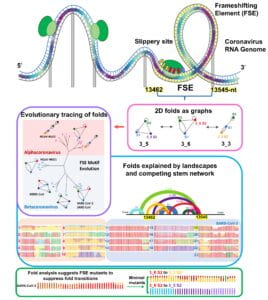Research from the Schlick Group published this month in the journal Proceedings of the National Academy of Sciences has been selected to appear in the PNAS Showcase on Kudos. The findings will provide insights in developing anti-viral therapeutics for a broad spectrum of coronaviruses.
Schlick writes: “It was rewarding to see how pure math, namely graph theory, can be used here so crucially to generate conformational landscapes of coronaviruses and propose RNA mutations that suppress key RNA structural transitions important to viral propagation. The RNA-As-Graphs (RAG) framework we have developed for years has relevant medical utility.”
Schlick postdoc Shuting Yan adds, “Studying RNA structures via mathematical modeling helps understand RNA structural evolution. The design of minimal mutations via our graph-based inverse folding algorithm can serve as potential therapeutic avenues.”
Reference
Yan, S., Zhu, Q., Hohl J., Dong, A., and Schlick, T., Evolution of Coronavirus Frameshifting Elements: Competing Stem Networks Explain Conservation and Variability, Proc. Nat. Acad. Sci., 120 (20) e2221324120 (2023)




